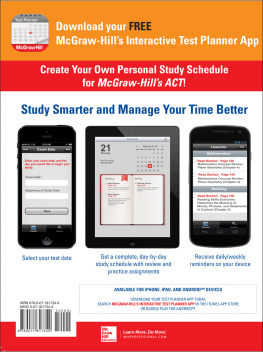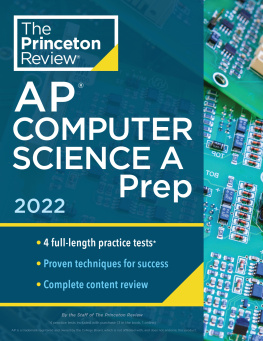McGraw-Hills
10 ACT Practice Tests
McGraw-Hills 10 ACT Practice Tests
THIRD EDITION
Steven W. Dulan
and the faculty of
Advantage Education

Copyright 2010, 2008 by The McGraw-Hill Companies, Inc. All rights reserved. Except as permitted under the United States Copyright Act of 1976, no part of this publication may be reproduced or distributed in any form or by any means, or stored in a database or retrieval system, without the prior written permission of the publisher.
ISBN: 978-0-07-173696-1
MHID: 0-07-173696-4
The material in this eBook also appears in the print version of this title: ISBN: 978-0-07-173697-8, MHID: 0-07-173697-2.
All trademarks are trademarks of their respective owners. Rather than put a trademark symbol after every occurrence of a trademarked name, we use names in an editorial fashion only, and to the benefit of the trademark owner, with no intention of infringement of the trademark. Where such designations appear in this book, they have been printed with initial caps.
McGraw-Hill eBooks are available at special quantity discounts to use as premiums and sales promotions, or for use in corporate training programs. To contact a representative please e-mail us at bulksales@mcgraw-hill.com.
This publication is designed to provide accurate and authoritative information in regard to the subject matter covered. It is sold with the understanding that neither the author nor the publisher is engaged in rendering legal, accounting, or other professional services. If legal advice or other expert assistance is required, the services of a competent professional person should be sought.
From a Declaration of Principles jointly adopted
by a Committee of the American Bar
Association and a Committee of Publishers.
TERMS OF USE
This is a copyrighted work and The McGraw-Hill Companies, Inc. (McGraw-Hill) and its licensors reserve all rights in and to the work. Use of this work is subject to these terms. Except as permitted under the Copyright Act of 1976 and the right to store and retrieve one copy of the work, you may not decompile, disassemble, reverse engineer, reproduce, modify, create derivative works based upon, transmit, distribute, disseminate, sell, publish or sublicense the work or any part of it without McGraw-Hills prior consent. You may use the work for your own noncommercial and personal use; any other use of the work is strictly prohibited. Your right to use the work may be terminated if you fail to comply with these terms.
THE WORK IS PROVIDED AS IS. McGRAW-HILL AND ITS LICENSORS MAKE NO GUARANTEES OR WARRANTIES AS TO THE ACCURACY, ADEQUACY OR COMPLETENESS OF OR RESULTS TO BE OBTAINED FROM USING THE WORK, INCLUDING ANY INFORMATION THAT CAN BE ACCESSED THROUGH THE WORK VIA HYPERLINK OR OTHERWISE, AND EXPRESSLY DISCLAIM ANY WARRANTY, EXPRESS OR IMPLIED, INCLUDING BUT NOT LIMITED TO IMPLIED WARRANTIES OF MERCHANTABILITY OR FITNESS FOR A PARTICULAR PURPOSE. McGraw-Hill and its licensors do not warrant or guarantee that the functions contained in the work will meet your requirements or that its operation will be uninterrupted or error free. Neither McGraw-Hill nor its licensors shall be liable to you or anyone else for any inaccuracy, error or omission, regardless of cause, in the work or for any damages resulting there from. McGraw-Hill has no responsibility for the content of any information accessed through the work. Under no circumstances shall McGraw-Hill and/or its licensors be liable for any indirect, incidental, special, punitive, consequential or similar damages that result from the use of or inability to use the work, even if any of them has been advised of the possibility of such damages. This limitation of liability shall apply to any claim or cause whatsoever whether such claim or cause arises in contract, tort or otherwise.
CONTENTS
ACKNOWLEDGMENTS
The author would like to acknowledge the contribution of the faculty and staff of Advantage Education. You are not only the smartest, but also the best. Special thanks to Lisa DiLiberti, Amy Dulan, Matt Mathison, Kathy Matteo, Blair Morley, Ryan Particka, Andrew Sanford, Kim So, and Amanda Thompson. All of you put in extra effort to make this book a success.
ABOUT THE AUTHOR
Steve Dulan has been involved with the ACT since 1982, when he received a score of 32 on his own test as a high school junior at Iron Mountain High School. That score qualified him for the State of Michigan Competitive Scholarship in 1983. In 1989, after serving as a U.S. Army Infantry Sergeant, and during his time as an undergraduate at Michigan State University, Steve became an ACT instructor. He has been helping students to prepare for success on the ACT and other standardized exams ever since. Steve attended The Thomas M. Cooley Law School on a full Honors Scholarship after achieving a 99th percentiIe score on his Law School Admission Test (LSAT). In fact, Steve scored in the 99th percentile on every standardized test he has ever taken. While attending law school, Steve continued to teach standardized test prep classes (including ACT, SAT, PSAT, GRE, GMAT, and LSAT) an average of thirty hours each week, and tutored some of his fellow law students in a variety of subjects and in essay exam writing techniques. Steve has also served as an instructor at the college and law school levels.
Thousands of students have benefited from Steves instruction, coaching, and admissions consulting and have gone on to the colleges of their choice. His students have gained admission to some of the most prestigious institutions in the world and received many scholarships of their own. A few of them even beat his ACT score! Since 1997, Steve has served as the President of Advantage Education (www.AdvantagEd.com), a company dedicated to providing effective and affordable test prep education in a variety of settings, including classes and seminars at high schools and colleges around the country, summer College Prep Camps at The University of Michigan, and one-on-one via the Internet worldwide.
McGraw-Hills 10 ACT Practice Tests
UNDERSTANDING THE ACT
WHAT IS THE ACT?
The authors of the ACT insist that the ACT is an achievement test, meaning that it is designed to measure your readiness for college instruction. There is ongoing debate about how well the ACT accomplishes that mission. What is not debated is that the ACT is not a direct measure of intelligence. It is not an IQ test. The ACT is certainly not a measure of your worth as a human being. It is not even a perfect measure of how well you will do in college. Theoretically, each of us has a specific potential to learn and acquire skills. The ACT doesnt measure your natural, inborn ability. If it did, we wouldnt be as successful as we are at raising students scores on ACT exams.
The ACT actually measures a certain knowledge base and skill set. It is trainable, meaning that you can do better on your ACT if you work on gaining the knowledge and acquiring the skills that are tested.
The ACT is broken up into four multiple-choice tests and one optional essay. The multiple-choice tests are called English, Mathematics, Reading, and Science Reasoning, respectively. They are always given in the same order. In fact, there is a lot of predictability when it comes to the ACT. The current exam still has very much in common with ACT exams from past years. This means that we basically know what is going to be on your ACT in terms of question types and content. The ACT Structure chart on the next page provides more information on the format of the ACT.
Next page

![Steven W. Dulan - ACT Cross-Platform Prep Course [2017]](/uploads/posts/book/88504/thumbs/steven-w-dulan-act-cross-platform-prep-course.jpg)




